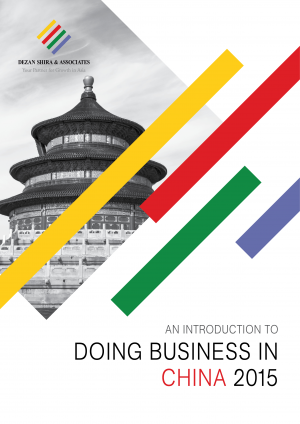China Regulatory Brief: New Import Tax Rates for Cross-border e-Commerce and Beijing Maternity Leave Policy
China to Implement Import Tax Policies for Cross-border e-Commerce on April 8
On March 24, the Ministry of Finance, the General Administration of Customs, and the State Administration of Taxation jointly issued the “Notice on Import Tax Policies for Retail of Cross-border e-Commerce.” The notice clarifies matters concerning import tax policies for retail of cross-border e-commerce (business to consumers), and will become effective as of April 8, 2016. The limit of a single transaction will be lifted from RMB 1000 (RMB 800 for Hong Kong, Macau and Taiwan) in existing parcel tax to RMB 2000. Meanwhile, annual trading for individuals is limited to RMB 20,000. Transactions within the limit can enjoy a temporary zero percent tariff rate, though import value-added tax (VAT) and consumer tax are not subject to the exemption and shall be charged at 70 percent of the taxable value. Relevant departments will develop and separately issue the List of Imported Commodities of Retail of Cross-border e-Commerce in order to ease collection administration operations.
Notice on Issues Concerning Tax Registration with the Uniform Social Credit Code
The State Administration of Taxation (SAT) has issued a notice to clarify matters concerning the use of the uniform social credit code and tax registration for taxpayers such as social organizations that are not included in the “three certificates in one” registration system reform. The Notice states that the 18 digit uniform social credit code should be used as taxpayer ID for entities registered with the organization setup and civil affairs department who obtained the uniform social credit code after January 1, 2016. The existing provisions should be observed for completion of the tax registration formalities and application for the tax registration certificate.
![]() RELATED: Business Advisory Services from Dezan Shira & Associates
RELATED: Business Advisory Services from Dezan Shira & Associates
Beijing to Cancel the Late Marriage Leave
On March 24, the People’s Congress of Beijing Standing Committee held their 16th meeting, which focused on the Amendment to the Regulations on Population & Family Planning of Beijing. The Draft retracts the previous provision on the late marriage leave and clarifies that couples are entitled to an additional seven days of leave on top of marriage leave specified by the state, meaning that the total amount of marriage leave comes to 10 days after the revision of provisions of Beijing’s population and family planning. The Draft maintains content pertaining to maternity leave, stating that female employees are entitled to 30 days of maternity leave, and spouses 15 days of leave, on top of the maternity leave specified by the state. It also states that the duration of maternity leave may be extended by one to three months subject to the approval of the employer.
Shanghai Reduces Social Insurance Premiums by 2.5 percent
The Shanghai Municipal Government recently stated that the city reduced the local social insurance premiums contributed by companies by 2.5 percent starting January 1 this year. Specifically, the employees’ pension, medical insurance, and unemployment insurance contributed by the employers were reduced by one percent, one percent, and 0.5 percent, respectively. This move is expected to relieve the burden for companies (including foreign companies) operating in Shanghai. China’s social security system consists of five distinct categories: pension, medical insurance, unemployment insurance, maternity insurance, and occupational injury insurance. Both the employer and employee contribute to each of the abovementioned categories, but at different percentages.
|
Asia Briefing Ltd. is a subsidiary of Dezan Shira & Associates. Dezan Shira is a specialist foreign direct investment practice, providing corporate establishment, business advisory, tax advisory and compliance, accounting, payroll, due diligence and financial review services to multinationals investing in China, Hong Kong, India, Vietnam, Singapore and the rest of ASEAN. For further information, please email china@dezshira.com or visit www.dezshira.com. Stay up to date with the latest business and investment trends in Asia by subscribing to our complimentary update service featuring news, commentary and regulatory insight. |

 Human Resources and Payroll in China 2015
Human Resources and Payroll in China 2015
This edition of Human Resources and Payroll in China, updated for 2015, provides a firm understanding of China’s laws and regulations related to human resources and payroll management – essential information for foreign investors looking to establish or already running a foreign-invested entity in China, local managers, and HR professionals needing to explain complex points of China’s labor policies.
 An Introduction to Doing Business in China 2015
An Introduction to Doing Business in China 2015
Doing Business in China 2015 is designed to introduce the fundamentals of investing in China. Compiled by the professionals at Dezan Shira & Associates, this comprehensive guide is ideal not only for businesses looking to enter the Chinese market, but also for companies that already have a presence here and want to keep up-to-date with the most recent and relevant policy changes.
 Selling, Sourcing and E-Commerce in China 2016 (First Edition)
Selling, Sourcing and E-Commerce in China 2016 (First Edition)
This guide, produced in collaboration with the experts at Dezan Shira & Associates, provides a comprehensive analysis of all these aspects of commerce in China. It discusses how foreign companies can best go about sourcing products from China; how foreign retailers can set up operations on the ground to sell directly to the country’s massive consumer class; and finally details how foreign enterprises can access China’s lucrative yet ostensibly complex e-commerce market.
- Previous Article Case Study: Commercial Contract Examination and Advisory in China
- Next Article Understanding Legal Proceedings in China






























